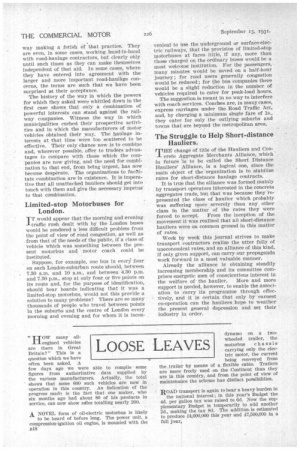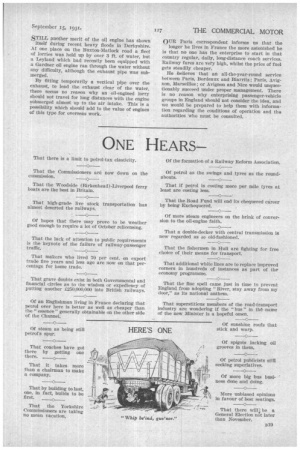'I TTOW many oil -1 -1 engined vehicles are there
Page 36

Page 37

If you've noticed an error in this article please click here to report it so we can fix it.
in Great Britain?" This is a question which we have often been asked. A few days ago we were able to compile• some figures from authoritative data supplied by the various manufacturers. Actually, the total shows that some 600 such vehicles are now in operation in this country. An indication of the progress made is the fact that one maker, who six months ago had about 80 of his products in service, can now show sales totalling nearly 200.
A NOVEL form of oil-electric motorbus is likely to be heard of before long. The power unit, a compression-ignition oil engine, is mounted with the B18 dynamo on a twowheeled trailer, the motorbus chassis carrying only the electric motor, the current being conveyed from the trailer by means of a flexible cable. Trailers are more freely used on the Continent than they are in this country, and from the point of view of maintenance the scheme has distinct possibilities.
ROAD transport is again to bear a heavy burden in the national interest; in this year's Budget the 4d. per gallon tax was raised to 6d. Now the supplementary Budget is temporarily to add another 2d., making the tax 8d. The addition. is estimated to produce £4,000,000 this year and £7,500,000 in. a full year, STILT; another merit of the oil engine has shown itself during recent heavy floods in Derbyshire. At one place on the Buxton-Matlock road a fleet of lorries was held up by over 3 ft. of water, tont a Leyland which had recently been equipped with a Gardner oil engine ran through the water without any difficulty, although the exhaust pipe was submerged.
By fitting temporarily a vertical pipe over the exhaust, to lead the exhaust clear of the water, there seems no reason why an oil-engined lorry should not travel for long distances with the engine submerged almost up to the air intake. This is a possibility which should add to the value of engines of this type for overseas work. OUR Paris correspondent informs us that the longer he lives in France the more astonished he is that no one has the enterprise to start in that country regular, daily, long-distance coach services. Railway fares are very high, whilst the price of fuel gets steadily cheaper.
He believes that an all-the-year-round service between Paris, Bordeaux and Biarritz; Paris, Avignon, Marseilles ; or Avignon and Nice would unquestionably succeed under proper management. There is no reason why enterprising passenger-vehicle groups in England should not consider the idea, and we would be prepared to help them with information regarding the conditions of operation and the authorities who must be consulted.




































































































